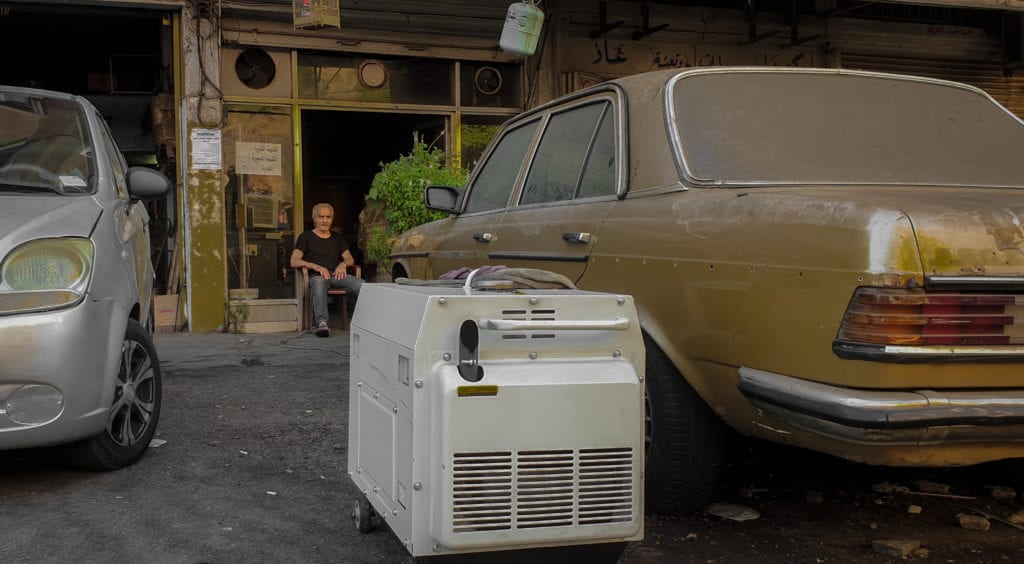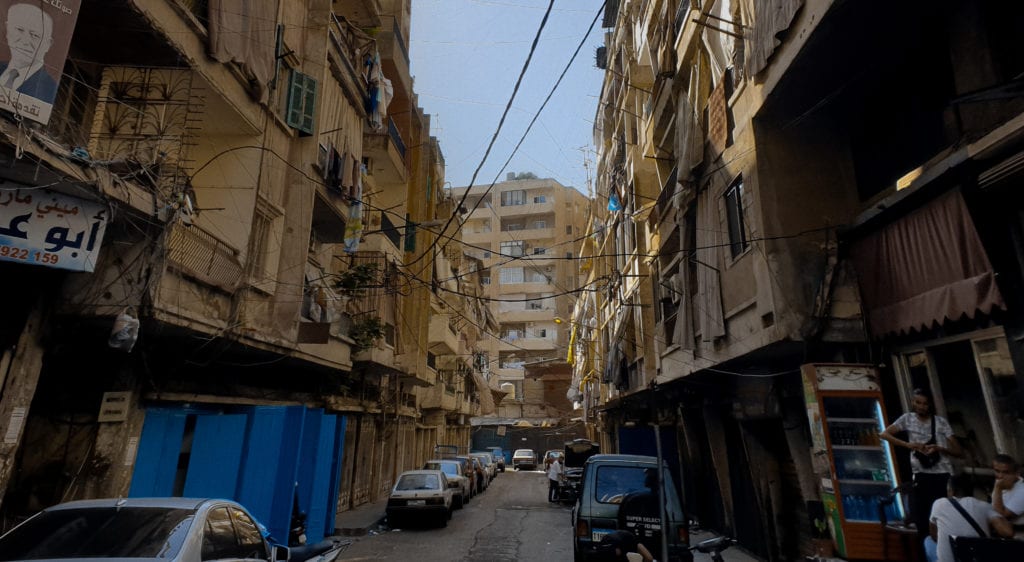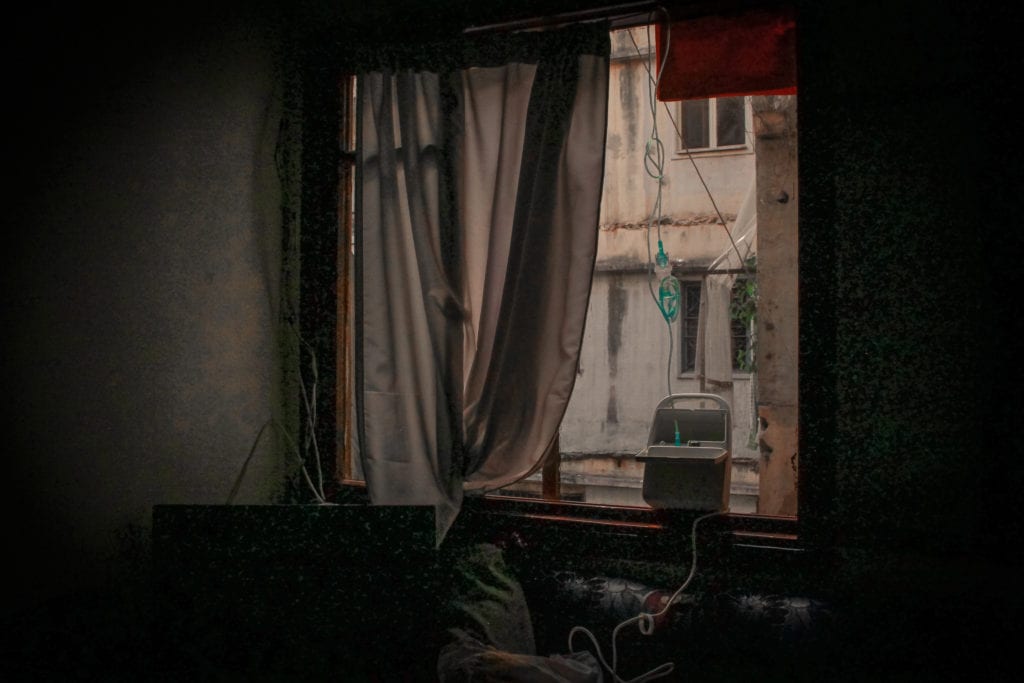It’s 4:45 in the afternoon, Um Ibraheem is preparing the ventilation kit sitting next to the entrance door. Her 2 year-old son, Ahmad, is begging to stay, he doesn’t want to leave home.
“If the electricity doesn’t come back by 5 p.m., we will head to the supermarket, the grocery shop or the butcher shop next door to use the electricity provided by their private generator.”
Since June, Um Ibraheem and her family have been living in distress as the electricity becomes increasingly unreliable and heavily rationed. Ahmad suffers from severe asthma and has to be put on an oxygen concentrator every 4 hours, but there is no guarantee that the electricity will come back on time. Any delay with the ventilation will result in serious implications on his health, jeopardizing his ability to breathe.

“Yesterday, the power cut lasted for 20 hours!” cried Um Ibraheem in frustration. “My son and I spent the day in the streets moving from one place to another because we can’t find fuel for the generator to turn it on.”
Lebanon has been suffering from prolonged power cuts that have plunged the country into darkness as a result of the government’s overdue payments to a Turkish company which is responsible for a quarter of the country’s electricity-generation capacity. The state’s foreign currency reserves are in severe shortage of dollars, dramatically impacting the country’s ability to secure essential resources.
As fuel supplies dwindle, prices have risen drastically. Frustrated citizens line up for hours in long queues outside petrol stations across the country. The fuel shortage also extends to diesel for private generators.
To the backdrop of all of this, Um Ibraheem went through the worst moments of her life a week ago, where she was about to lose her son.
Unable to breathe, Ahmad woke up in the middle of the night suffocating and was in urgent need of hospitalization. Um Ibraheem rushed him to the hospital for ventilation but the economic crisis has severely stripped hospitals of the equipment necessary to treat his case.
“I roamed the streets for four hours looking for hospitals to treat my son,” she said, her voice shaking. “His face turned green. He was about to die in my hands.” She closed her eyes for a moment as streams of memories stormed her mind. “Doctors told me, ‘your kid is asking for a breath of life’, but I was completely helpless at that moment.”.


Um Ibraheem finally found a hospital that was equipped to handle his case. The doctor did multiple medical tests and transferred him to intensive care for three days for treatment of the severe asthma that filled up his lungs with phlegm.
Despite the doctor’s recommendation to Um Ibraheem to keep her son for a few more days, she refused.
“Barely any nurses showed up to check on my son,” she recalled. “The hospital was running low on fuel and barely turned the AC or the electricity on. It was so neglected that I was afraid to catch a virus there. My son’s breathing improved, but the only thing I was thinking of at that time was a way out of this hell.”
In worrying developments, private hospitals announced a reduction in operations to emergency procedures, including kidney dialysis and cancer patients, to conserve what’s left of their resources, including fuel; a scenario that Sleiman Haroun, the head of the syndicate of private hospitals described as “the end of the world.”
If no solution is found soon, many patients will lose their lives. Moreover, the economic crisis has forced 25% of medical staff to leave the country, leaving the health sector critically understaffed, which has resulted in further deterioration in the quality of medical service.
Um Ibraheem’s case is one of many in the country. In Tripoli, Lebanon’s second-largest city, protests have teetered on the edge of violence. Groups of armed civilians took to the streets to protest the deteriorating economic conditions, initially triggered by a circulated photo (which was later revealed to be photoshopped) of a father crying out for his son who lost his life as a result of the electricity cut.
Some days later, on July 13th, people in Lebanon woke up to heartbreaking news of the death of a sick father who lost his life as a result of a sudden prolonged power cut that took his breath away as he slept.
Triggered by the unfortunate events, 22 year-old cafe owner Bilal Al-Amrie posted an announcement on Facebook calling people to come to his café ‘Park Tripoli’ to use the electricity for their ventilation machines.
“To see a person losing life because of something like electricity, it struck me deeply,” Bilal told Daraj. “From that moment, we took the decision to open our café 24/7 and spread the word to reach out to families for support.”
Two days after his post, Bilal has received more than 15 calls from people asking whether the news was true or not. He has also received a lot of requests for air ventilators and asthma inhalers so he is seeking a supplier in an attempt to provide them for free.


Multiple cafes have responded to his call in Tripoli and have also started providing electricity to patients in need. This electricity has become a lifeline for them as hospitals themselves are struggling for a breath of their own.
“Amid this hardship that we are going through, people have started to lose hope.” Bilal explained. “We want to plant the seed of hope and tell others that we are there for one another and to encourage similar initiatives.”.
Read Also:






